Professional Code of Conduct: Ethical Decision Making and Equality
VerifiedAdded on 2023/05/28
|17
|4439
|59
Essay
AI Summary
This essay explores the main features of a professional code of conduct for staff in an elderly care home, focusing on how it ensures ethical decision-making, equality, and fair treatment. Key features discussed include responsibility, expertise, professionalism, demeanor, employee advocacy, and innovativeness. The essay also addresses potential shortcomings of the code of conduct, such as enforcement obligations and cultural differences. Furthermore, it examines the application of ethical theories like consequentialism and deontology in guiding ethical actions, specifically in a scenario involving a potentially suspicious individual near a school. The author justifies reporting the situation to the police based on these ethical frameworks, emphasizing the importance of safeguarding society and preventing potential harm. The document concludes by highlighting the balance between individual rights and the collective good in ethical decision-making.
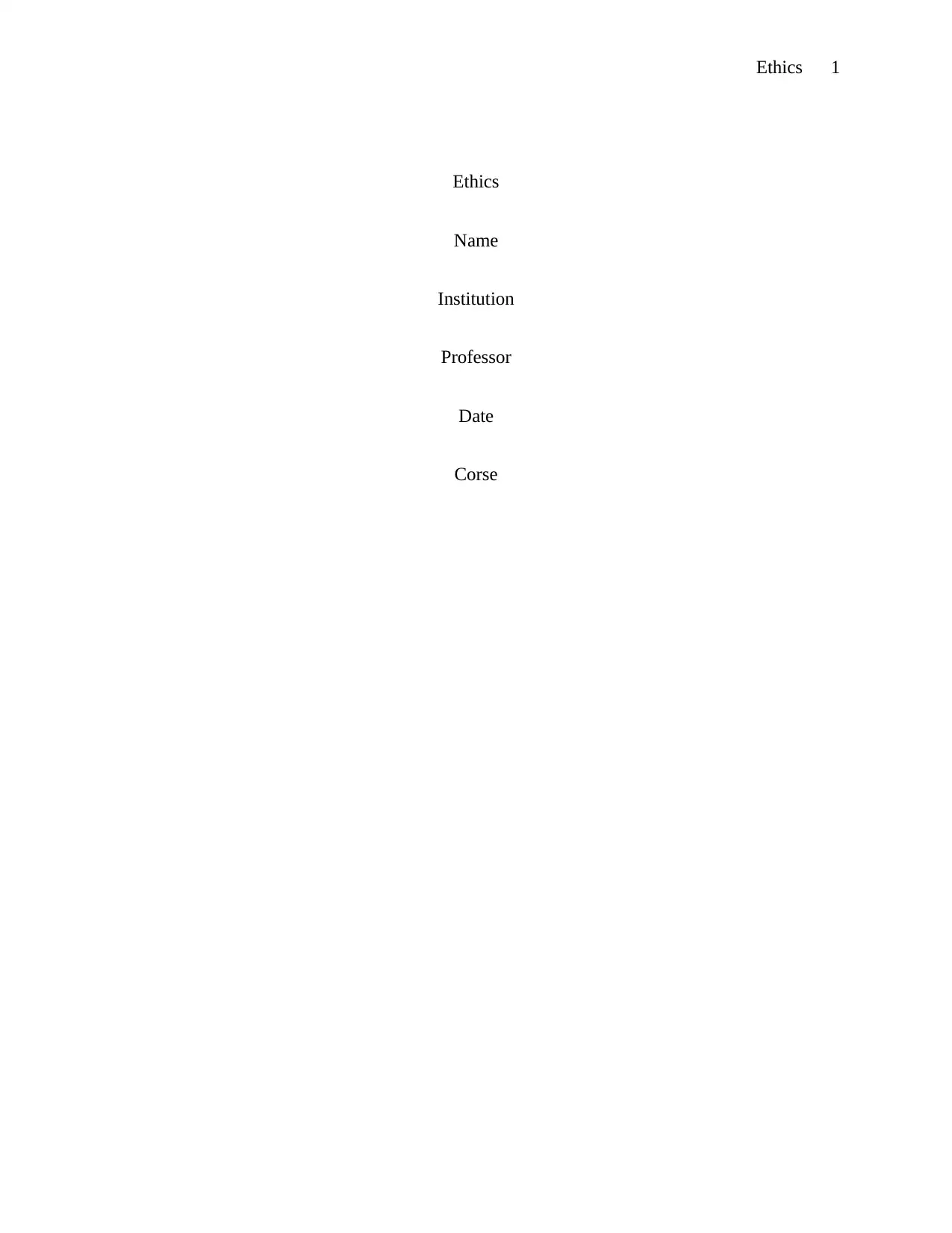
Ethics 1
Ethics
Name
Institution
Professor
Date
Corse
Ethics
Name
Institution
Professor
Date
Corse
Paraphrase This Document
Need a fresh take? Get an instant paraphrase of this document with our AI Paraphraser
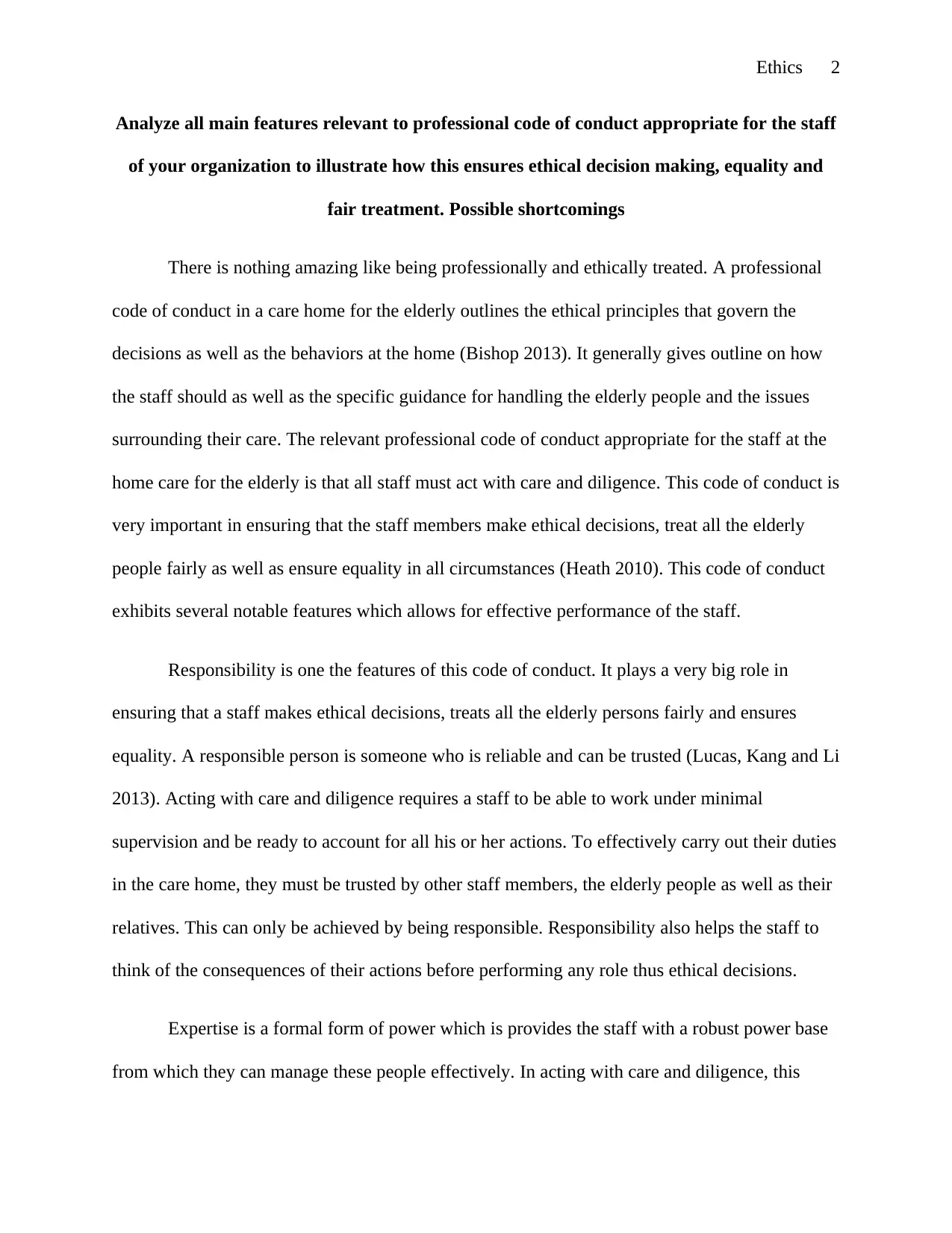
Ethics 2
Analyze all main features relevant to professional code of conduct appropriate for the staff
of your organization to illustrate how this ensures ethical decision making, equality and
fair treatment. Possible shortcomings
There is nothing amazing like being professionally and ethically treated. A professional
code of conduct in a care home for the elderly outlines the ethical principles that govern the
decisions as well as the behaviors at the home (Bishop 2013). It generally gives outline on how
the staff should as well as the specific guidance for handling the elderly people and the issues
surrounding their care. The relevant professional code of conduct appropriate for the staff at the
home care for the elderly is that all staff must act with care and diligence. This code of conduct is
very important in ensuring that the staff members make ethical decisions, treat all the elderly
people fairly as well as ensure equality in all circumstances (Heath 2010). This code of conduct
exhibits several notable features which allows for effective performance of the staff.
Responsibility is one the features of this code of conduct. It plays a very big role in
ensuring that a staff makes ethical decisions, treats all the elderly persons fairly and ensures
equality. A responsible person is someone who is reliable and can be trusted (Lucas, Kang and Li
2013). Acting with care and diligence requires a staff to be able to work under minimal
supervision and be ready to account for all his or her actions. To effectively carry out their duties
in the care home, they must be trusted by other staff members, the elderly people as well as their
relatives. This can only be achieved by being responsible. Responsibility also helps the staff to
think of the consequences of their actions before performing any role thus ethical decisions.
Expertise is a formal form of power which is provides the staff with a robust power base
from which they can manage these people effectively. In acting with care and diligence, this
Analyze all main features relevant to professional code of conduct appropriate for the staff
of your organization to illustrate how this ensures ethical decision making, equality and
fair treatment. Possible shortcomings
There is nothing amazing like being professionally and ethically treated. A professional
code of conduct in a care home for the elderly outlines the ethical principles that govern the
decisions as well as the behaviors at the home (Bishop 2013). It generally gives outline on how
the staff should as well as the specific guidance for handling the elderly people and the issues
surrounding their care. The relevant professional code of conduct appropriate for the staff at the
home care for the elderly is that all staff must act with care and diligence. This code of conduct is
very important in ensuring that the staff members make ethical decisions, treat all the elderly
people fairly as well as ensure equality in all circumstances (Heath 2010). This code of conduct
exhibits several notable features which allows for effective performance of the staff.
Responsibility is one the features of this code of conduct. It plays a very big role in
ensuring that a staff makes ethical decisions, treats all the elderly persons fairly and ensures
equality. A responsible person is someone who is reliable and can be trusted (Lucas, Kang and Li
2013). Acting with care and diligence requires a staff to be able to work under minimal
supervision and be ready to account for all his or her actions. To effectively carry out their duties
in the care home, they must be trusted by other staff members, the elderly people as well as their
relatives. This can only be achieved by being responsible. Responsibility also helps the staff to
think of the consequences of their actions before performing any role thus ethical decisions.
Expertise is a formal form of power which is provides the staff with a robust power base
from which they can manage these people effectively. In acting with care and diligence, this
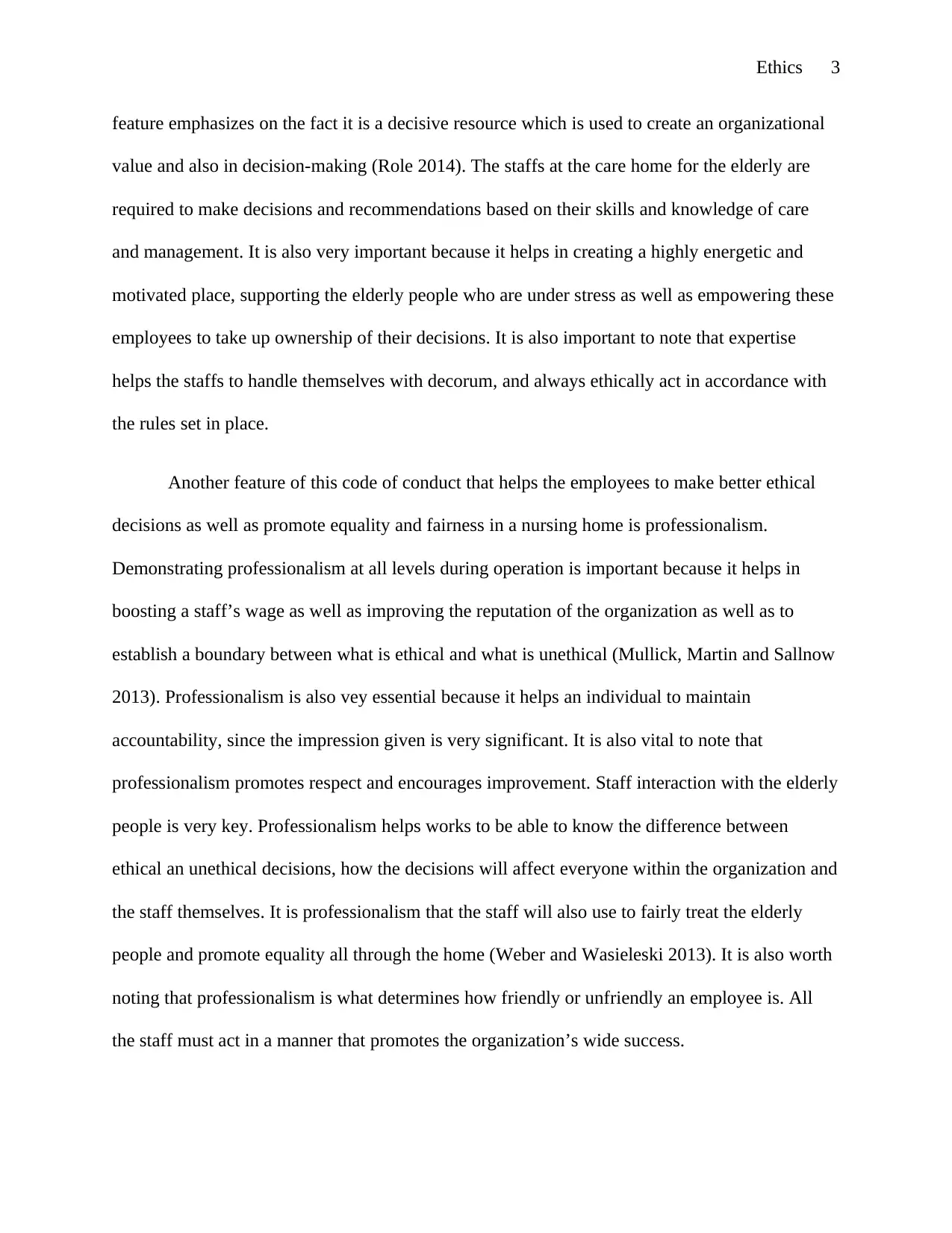
Ethics 3
feature emphasizes on the fact it is a decisive resource which is used to create an organizational
value and also in decision-making (Role 2014). The staffs at the care home for the elderly are
required to make decisions and recommendations based on their skills and knowledge of care
and management. It is also very important because it helps in creating a highly energetic and
motivated place, supporting the elderly people who are under stress as well as empowering these
employees to take up ownership of their decisions. It is also important to note that expertise
helps the staffs to handle themselves with decorum, and always ethically act in accordance with
the rules set in place.
Another feature of this code of conduct that helps the employees to make better ethical
decisions as well as promote equality and fairness in a nursing home is professionalism.
Demonstrating professionalism at all levels during operation is important because it helps in
boosting a staff’s wage as well as improving the reputation of the organization as well as to
establish a boundary between what is ethical and what is unethical (Mullick, Martin and Sallnow
2013). Professionalism is also vey essential because it helps an individual to maintain
accountability, since the impression given is very significant. It is also vital to note that
professionalism promotes respect and encourages improvement. Staff interaction with the elderly
people is very key. Professionalism helps works to be able to know the difference between
ethical an unethical decisions, how the decisions will affect everyone within the organization and
the staff themselves. It is professionalism that the staff will also use to fairly treat the elderly
people and promote equality all through the home (Weber and Wasieleski 2013). It is also worth
noting that professionalism is what determines how friendly or unfriendly an employee is. All
the staff must act in a manner that promotes the organization’s wide success.
feature emphasizes on the fact it is a decisive resource which is used to create an organizational
value and also in decision-making (Role 2014). The staffs at the care home for the elderly are
required to make decisions and recommendations based on their skills and knowledge of care
and management. It is also very important because it helps in creating a highly energetic and
motivated place, supporting the elderly people who are under stress as well as empowering these
employees to take up ownership of their decisions. It is also important to note that expertise
helps the staffs to handle themselves with decorum, and always ethically act in accordance with
the rules set in place.
Another feature of this code of conduct that helps the employees to make better ethical
decisions as well as promote equality and fairness in a nursing home is professionalism.
Demonstrating professionalism at all levels during operation is important because it helps in
boosting a staff’s wage as well as improving the reputation of the organization as well as to
establish a boundary between what is ethical and what is unethical (Mullick, Martin and Sallnow
2013). Professionalism is also vey essential because it helps an individual to maintain
accountability, since the impression given is very significant. It is also vital to note that
professionalism promotes respect and encourages improvement. Staff interaction with the elderly
people is very key. Professionalism helps works to be able to know the difference between
ethical an unethical decisions, how the decisions will affect everyone within the organization and
the staff themselves. It is professionalism that the staff will also use to fairly treat the elderly
people and promote equality all through the home (Weber and Wasieleski 2013). It is also worth
noting that professionalism is what determines how friendly or unfriendly an employee is. All
the staff must act in a manner that promotes the organization’s wide success.
⊘ This is a preview!⊘
Do you want full access?
Subscribe today to unlock all pages.

Trusted by 1+ million students worldwide
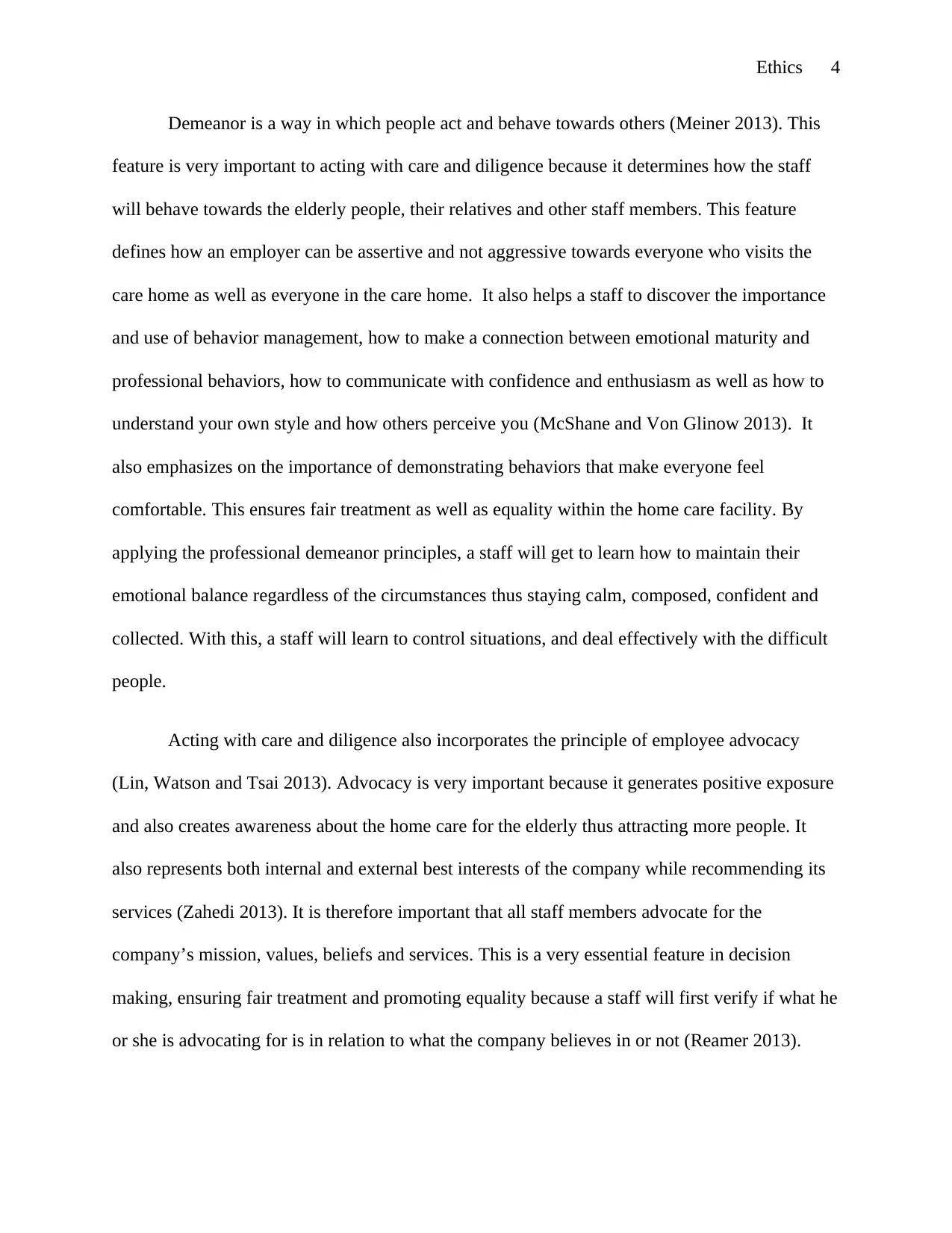
Ethics 4
Demeanor is a way in which people act and behave towards others (Meiner 2013). This
feature is very important to acting with care and diligence because it determines how the staff
will behave towards the elderly people, their relatives and other staff members. This feature
defines how an employer can be assertive and not aggressive towards everyone who visits the
care home as well as everyone in the care home. It also helps a staff to discover the importance
and use of behavior management, how to make a connection between emotional maturity and
professional behaviors, how to communicate with confidence and enthusiasm as well as how to
understand your own style and how others perceive you (McShane and Von Glinow 2013). It
also emphasizes on the importance of demonstrating behaviors that make everyone feel
comfortable. This ensures fair treatment as well as equality within the home care facility. By
applying the professional demeanor principles, a staff will get to learn how to maintain their
emotional balance regardless of the circumstances thus staying calm, composed, confident and
collected. With this, a staff will learn to control situations, and deal effectively with the difficult
people.
Acting with care and diligence also incorporates the principle of employee advocacy
(Lin, Watson and Tsai 2013). Advocacy is very important because it generates positive exposure
and also creates awareness about the home care for the elderly thus attracting more people. It
also represents both internal and external best interests of the company while recommending its
services (Zahedi 2013). It is therefore important that all staff members advocate for the
company’s mission, values, beliefs and services. This is a very essential feature in decision
making, ensuring fair treatment and promoting equality because a staff will first verify if what he
or she is advocating for is in relation to what the company believes in or not (Reamer 2013).
Demeanor is a way in which people act and behave towards others (Meiner 2013). This
feature is very important to acting with care and diligence because it determines how the staff
will behave towards the elderly people, their relatives and other staff members. This feature
defines how an employer can be assertive and not aggressive towards everyone who visits the
care home as well as everyone in the care home. It also helps a staff to discover the importance
and use of behavior management, how to make a connection between emotional maturity and
professional behaviors, how to communicate with confidence and enthusiasm as well as how to
understand your own style and how others perceive you (McShane and Von Glinow 2013). It
also emphasizes on the importance of demonstrating behaviors that make everyone feel
comfortable. This ensures fair treatment as well as equality within the home care facility. By
applying the professional demeanor principles, a staff will get to learn how to maintain their
emotional balance regardless of the circumstances thus staying calm, composed, confident and
collected. With this, a staff will learn to control situations, and deal effectively with the difficult
people.
Acting with care and diligence also incorporates the principle of employee advocacy
(Lin, Watson and Tsai 2013). Advocacy is very important because it generates positive exposure
and also creates awareness about the home care for the elderly thus attracting more people. It
also represents both internal and external best interests of the company while recommending its
services (Zahedi 2013). It is therefore important that all staff members advocate for the
company’s mission, values, beliefs and services. This is a very essential feature in decision
making, ensuring fair treatment and promoting equality because a staff will first verify if what he
or she is advocating for is in relation to what the company believes in or not (Reamer 2013).
Paraphrase This Document
Need a fresh take? Get an instant paraphrase of this document with our AI Paraphraser
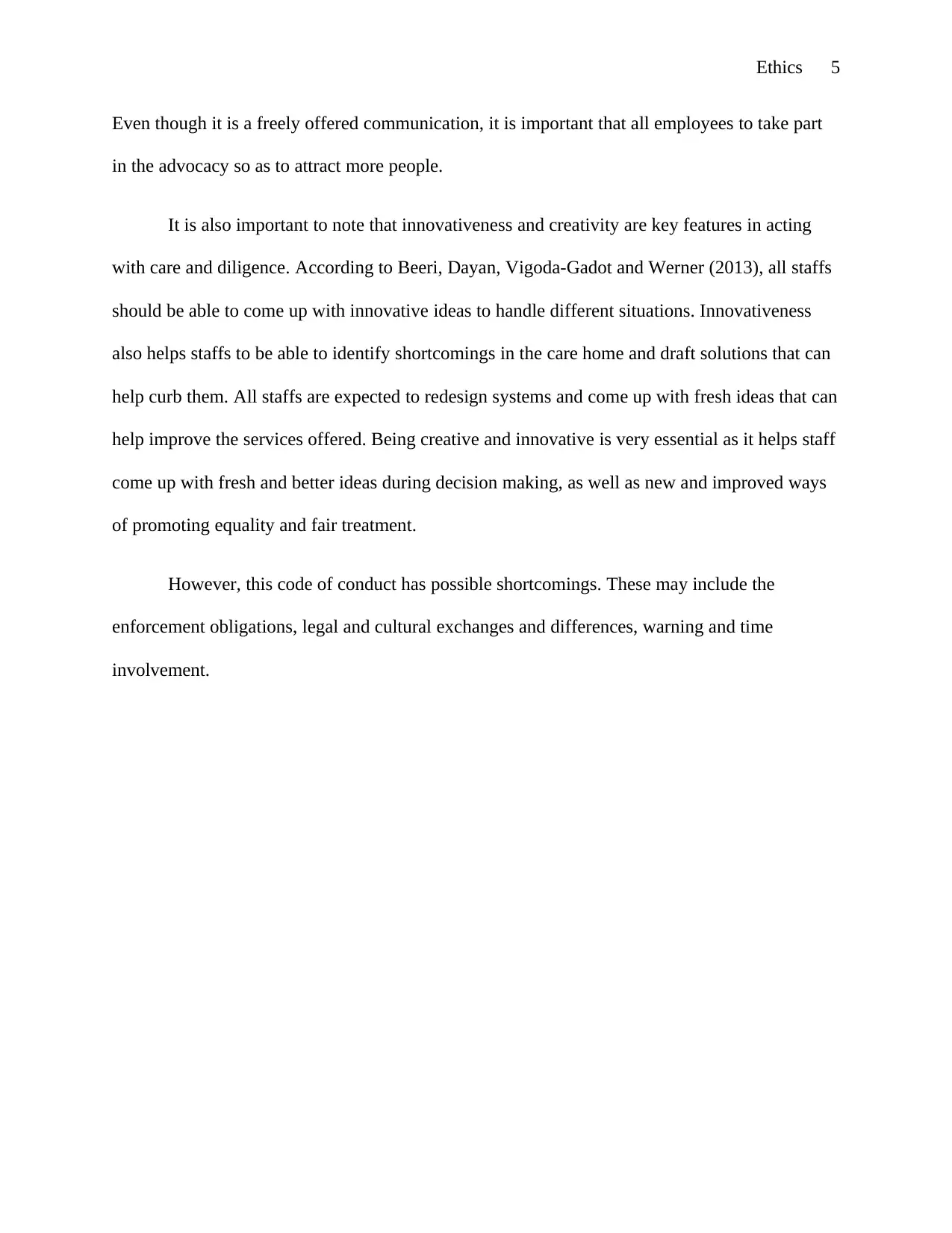
Ethics 5
Even though it is a freely offered communication, it is important that all employees to take part
in the advocacy so as to attract more people.
It is also important to note that innovativeness and creativity are key features in acting
with care and diligence. According to Beeri, Dayan, Vigoda-Gadot and Werner (2013), all staffs
should be able to come up with innovative ideas to handle different situations. Innovativeness
also helps staffs to be able to identify shortcomings in the care home and draft solutions that can
help curb them. All staffs are expected to redesign systems and come up with fresh ideas that can
help improve the services offered. Being creative and innovative is very essential as it helps staff
come up with fresh and better ideas during decision making, as well as new and improved ways
of promoting equality and fair treatment.
However, this code of conduct has possible shortcomings. These may include the
enforcement obligations, legal and cultural exchanges and differences, warning and time
involvement.
Even though it is a freely offered communication, it is important that all employees to take part
in the advocacy so as to attract more people.
It is also important to note that innovativeness and creativity are key features in acting
with care and diligence. According to Beeri, Dayan, Vigoda-Gadot and Werner (2013), all staffs
should be able to come up with innovative ideas to handle different situations. Innovativeness
also helps staffs to be able to identify shortcomings in the care home and draft solutions that can
help curb them. All staffs are expected to redesign systems and come up with fresh ideas that can
help improve the services offered. Being creative and innovative is very essential as it helps staff
come up with fresh and better ideas during decision making, as well as new and improved ways
of promoting equality and fair treatment.
However, this code of conduct has possible shortcomings. These may include the
enforcement obligations, legal and cultural exchanges and differences, warning and time
involvement.
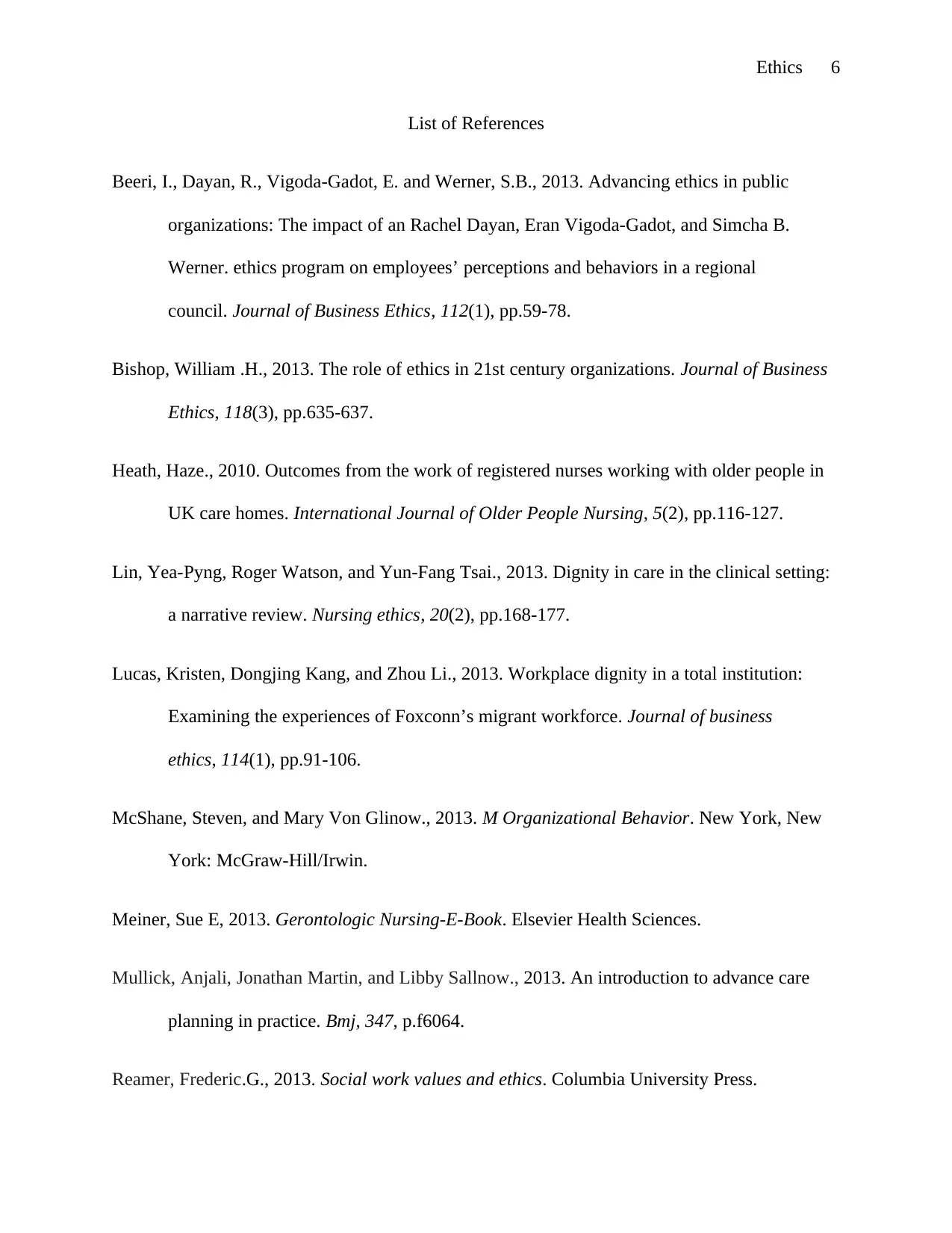
Ethics 6
List of References
Beeri, I., Dayan, R., Vigoda-Gadot, E. and Werner, S.B., 2013. Advancing ethics in public
organizations: The impact of an Rachel Dayan, Eran Vigoda-Gadot, and Simcha B.
Werner. ethics program on employees’ perceptions and behaviors in a regional
council. Journal of Business Ethics, 112(1), pp.59-78.
Bishop, William .H., 2013. The role of ethics in 21st century organizations. Journal of Business
Ethics, 118(3), pp.635-637.
Heath, Haze., 2010. Outcomes from the work of registered nurses working with older people in
UK care homes. International Journal of Older People Nursing, 5(2), pp.116-127.
Lin, Yea-Pyng, Roger Watson, and Yun-Fang Tsai., 2013. Dignity in care in the clinical setting:
a narrative review. Nursing ethics, 20(2), pp.168-177.
Lucas, Kristen, Dongjing Kang, and Zhou Li., 2013. Workplace dignity in a total institution:
Examining the experiences of Foxconn’s migrant workforce. Journal of business
ethics, 114(1), pp.91-106.
McShane, Steven, and Mary Von Glinow., 2013. M Organizational Behavior. New York, New
York: McGraw-Hill/Irwin.
Meiner, Sue E, 2013. Gerontologic Nursing-E-Book. Elsevier Health Sciences.
Mullick, Anjali, Jonathan Martin, and Libby Sallnow., 2013. An introduction to advance care
planning in practice. Bmj, 347, p.f6064.
Reamer, Frederic.G., 2013. Social work values and ethics. Columbia University Press.
List of References
Beeri, I., Dayan, R., Vigoda-Gadot, E. and Werner, S.B., 2013. Advancing ethics in public
organizations: The impact of an Rachel Dayan, Eran Vigoda-Gadot, and Simcha B.
Werner. ethics program on employees’ perceptions and behaviors in a regional
council. Journal of Business Ethics, 112(1), pp.59-78.
Bishop, William .H., 2013. The role of ethics in 21st century organizations. Journal of Business
Ethics, 118(3), pp.635-637.
Heath, Haze., 2010. Outcomes from the work of registered nurses working with older people in
UK care homes. International Journal of Older People Nursing, 5(2), pp.116-127.
Lin, Yea-Pyng, Roger Watson, and Yun-Fang Tsai., 2013. Dignity in care in the clinical setting:
a narrative review. Nursing ethics, 20(2), pp.168-177.
Lucas, Kristen, Dongjing Kang, and Zhou Li., 2013. Workplace dignity in a total institution:
Examining the experiences of Foxconn’s migrant workforce. Journal of business
ethics, 114(1), pp.91-106.
McShane, Steven, and Mary Von Glinow., 2013. M Organizational Behavior. New York, New
York: McGraw-Hill/Irwin.
Meiner, Sue E, 2013. Gerontologic Nursing-E-Book. Elsevier Health Sciences.
Mullick, Anjali, Jonathan Martin, and Libby Sallnow., 2013. An introduction to advance care
planning in practice. Bmj, 347, p.f6064.
Reamer, Frederic.G., 2013. Social work values and ethics. Columbia University Press.
⊘ This is a preview!⊘
Do you want full access?
Subscribe today to unlock all pages.

Trusted by 1+ million students worldwide
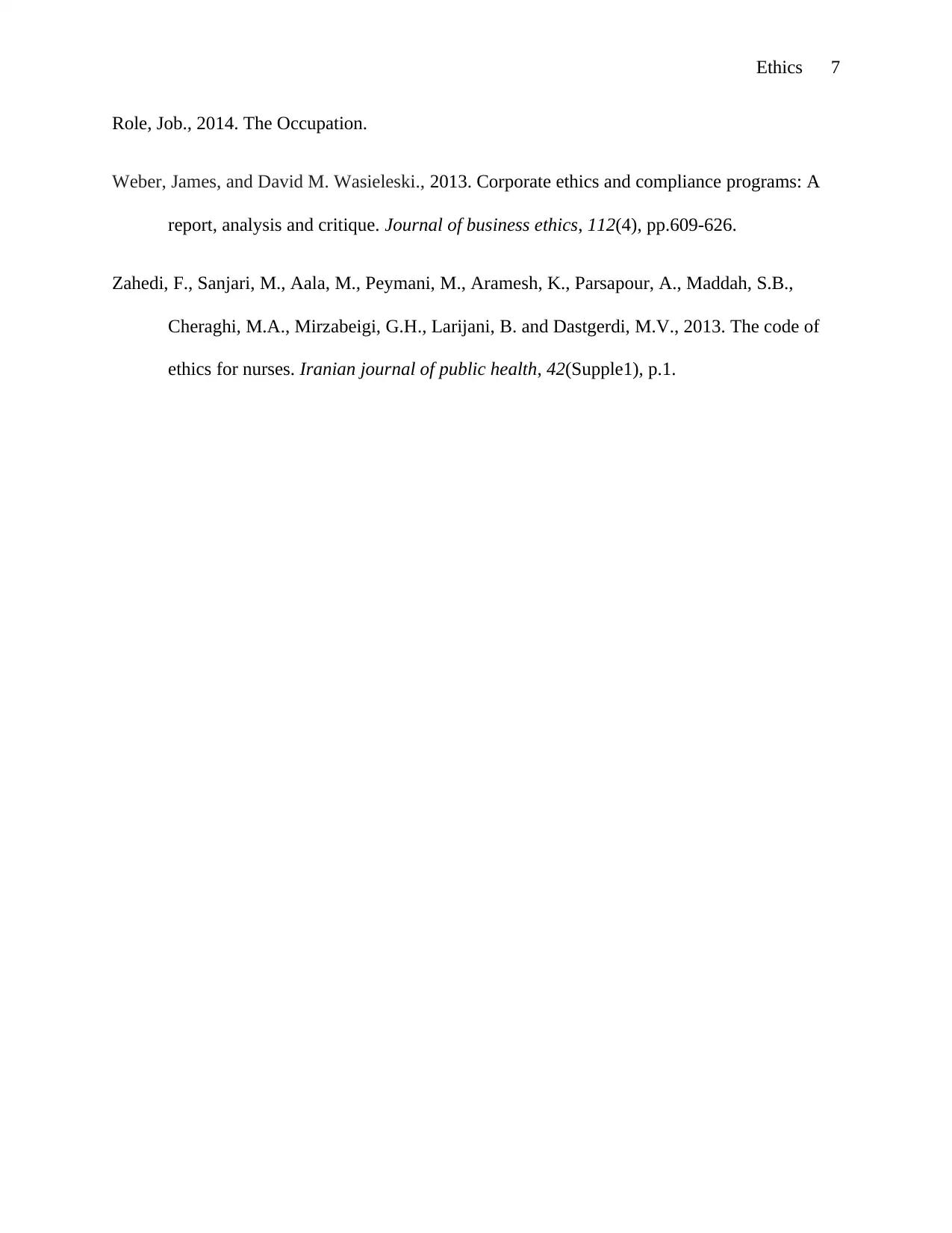
Ethics 7
Role, Job., 2014. The Occupation.
Weber, James, and David M. Wasieleski., 2013. Corporate ethics and compliance programs: A
report, analysis and critique. Journal of business ethics, 112(4), pp.609-626.
Zahedi, F., Sanjari, M., Aala, M., Peymani, M., Aramesh, K., Parsapour, A., Maddah, S.B.,
Cheraghi, M.A., Mirzabeigi, G.H., Larijani, B. and Dastgerdi, M.V., 2013. The code of
ethics for nurses. Iranian journal of public health, 42(Supple1), p.1.
Role, Job., 2014. The Occupation.
Weber, James, and David M. Wasieleski., 2013. Corporate ethics and compliance programs: A
report, analysis and critique. Journal of business ethics, 112(4), pp.609-626.
Zahedi, F., Sanjari, M., Aala, M., Peymani, M., Aramesh, K., Parsapour, A., Maddah, S.B.,
Cheraghi, M.A., Mirzabeigi, G.H., Larijani, B. and Dastgerdi, M.V., 2013. The code of
ethics for nurses. Iranian journal of public health, 42(Supple1), p.1.
Paraphrase This Document
Need a fresh take? Get an instant paraphrase of this document with our AI Paraphraser
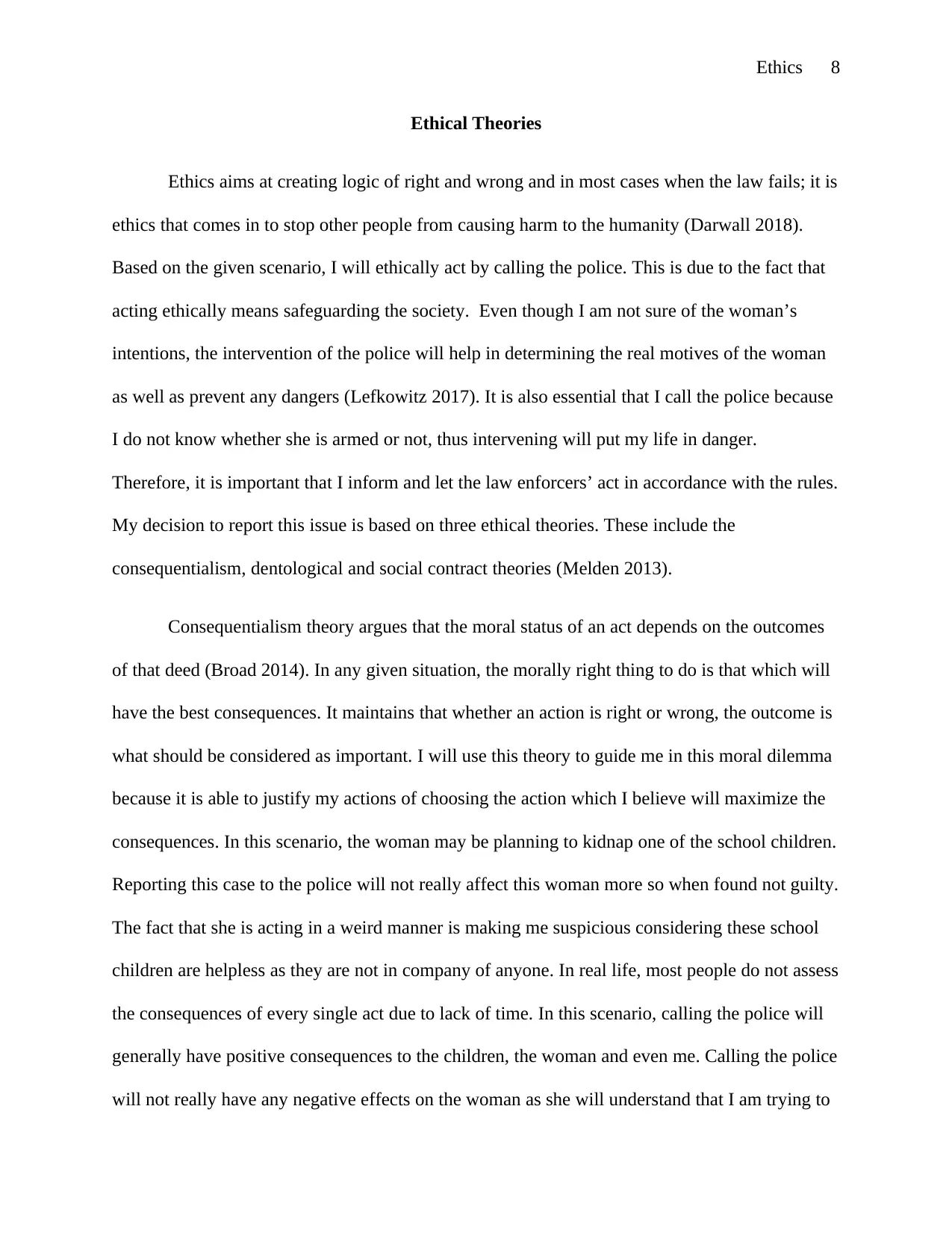
Ethics 8
Ethical Theories
Ethics aims at creating logic of right and wrong and in most cases when the law fails; it is
ethics that comes in to stop other people from causing harm to the humanity (Darwall 2018).
Based on the given scenario, I will ethically act by calling the police. This is due to the fact that
acting ethically means safeguarding the society. Even though I am not sure of the woman’s
intentions, the intervention of the police will help in determining the real motives of the woman
as well as prevent any dangers (Lefkowitz 2017). It is also essential that I call the police because
I do not know whether she is armed or not, thus intervening will put my life in danger.
Therefore, it is important that I inform and let the law enforcers’ act in accordance with the rules.
My decision to report this issue is based on three ethical theories. These include the
consequentialism, dentological and social contract theories (Melden 2013).
Consequentialism theory argues that the moral status of an act depends on the outcomes
of that deed (Broad 2014). In any given situation, the morally right thing to do is that which will
have the best consequences. It maintains that whether an action is right or wrong, the outcome is
what should be considered as important. I will use this theory to guide me in this moral dilemma
because it is able to justify my actions of choosing the action which I believe will maximize the
consequences. In this scenario, the woman may be planning to kidnap one of the school children.
Reporting this case to the police will not really affect this woman more so when found not guilty.
The fact that she is acting in a weird manner is making me suspicious considering these school
children are helpless as they are not in company of anyone. In real life, most people do not assess
the consequences of every single act due to lack of time. In this scenario, calling the police will
generally have positive consequences to the children, the woman and even me. Calling the police
will not really have any negative effects on the woman as she will understand that I am trying to
Ethical Theories
Ethics aims at creating logic of right and wrong and in most cases when the law fails; it is
ethics that comes in to stop other people from causing harm to the humanity (Darwall 2018).
Based on the given scenario, I will ethically act by calling the police. This is due to the fact that
acting ethically means safeguarding the society. Even though I am not sure of the woman’s
intentions, the intervention of the police will help in determining the real motives of the woman
as well as prevent any dangers (Lefkowitz 2017). It is also essential that I call the police because
I do not know whether she is armed or not, thus intervening will put my life in danger.
Therefore, it is important that I inform and let the law enforcers’ act in accordance with the rules.
My decision to report this issue is based on three ethical theories. These include the
consequentialism, dentological and social contract theories (Melden 2013).
Consequentialism theory argues that the moral status of an act depends on the outcomes
of that deed (Broad 2014). In any given situation, the morally right thing to do is that which will
have the best consequences. It maintains that whether an action is right or wrong, the outcome is
what should be considered as important. I will use this theory to guide me in this moral dilemma
because it is able to justify my actions of choosing the action which I believe will maximize the
consequences. In this scenario, the woman may be planning to kidnap one of the school children.
Reporting this case to the police will not really affect this woman more so when found not guilty.
The fact that she is acting in a weird manner is making me suspicious considering these school
children are helpless as they are not in company of anyone. In real life, most people do not assess
the consequences of every single act due to lack of time. In this scenario, calling the police will
generally have positive consequences to the children, the woman and even me. Calling the police
will not really have any negative effects on the woman as she will understand that I am trying to
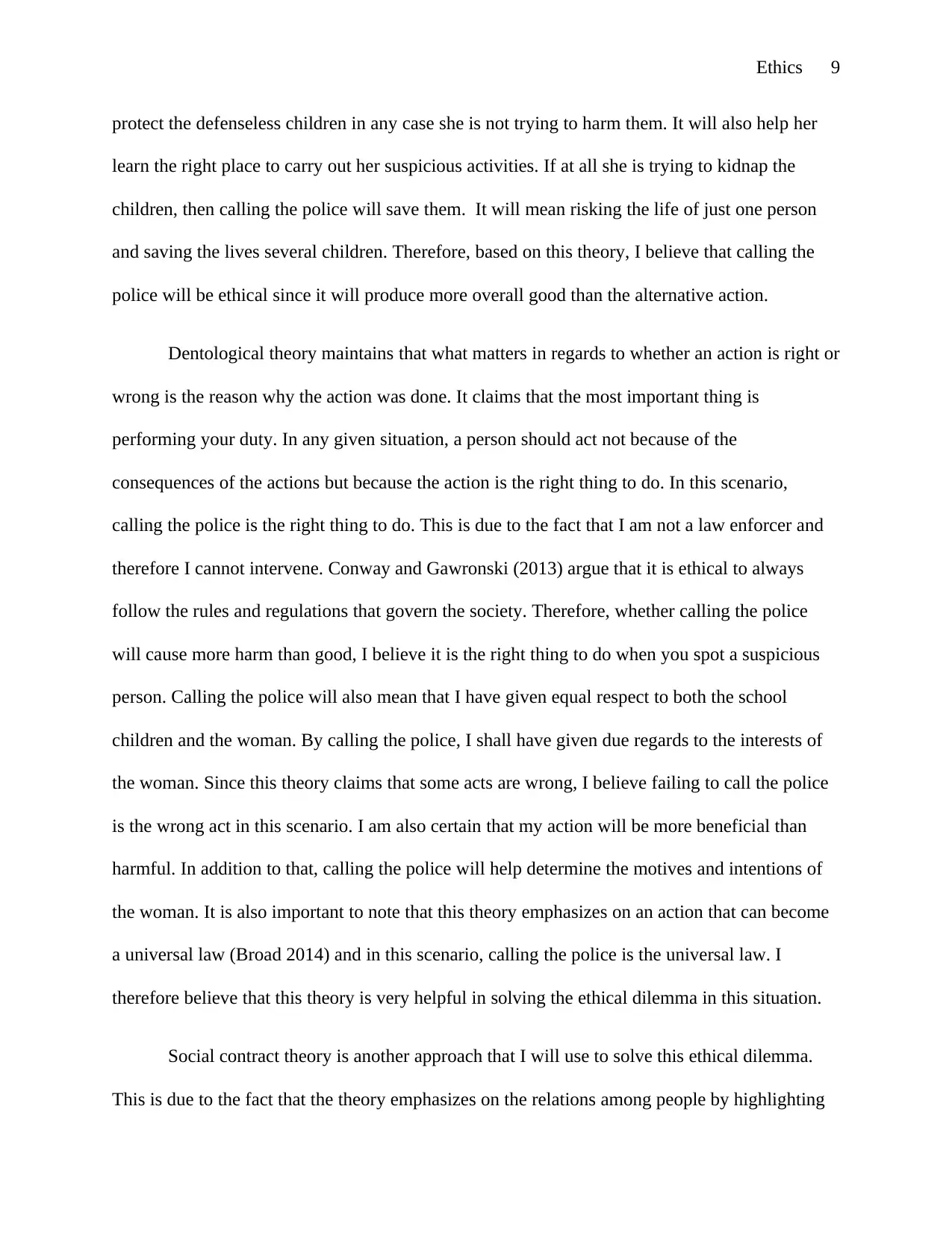
Ethics 9
protect the defenseless children in any case she is not trying to harm them. It will also help her
learn the right place to carry out her suspicious activities. If at all she is trying to kidnap the
children, then calling the police will save them. It will mean risking the life of just one person
and saving the lives several children. Therefore, based on this theory, I believe that calling the
police will be ethical since it will produce more overall good than the alternative action.
Dentological theory maintains that what matters in regards to whether an action is right or
wrong is the reason why the action was done. It claims that the most important thing is
performing your duty. In any given situation, a person should act not because of the
consequences of the actions but because the action is the right thing to do. In this scenario,
calling the police is the right thing to do. This is due to the fact that I am not a law enforcer and
therefore I cannot intervene. Conway and Gawronski (2013) argue that it is ethical to always
follow the rules and regulations that govern the society. Therefore, whether calling the police
will cause more harm than good, I believe it is the right thing to do when you spot a suspicious
person. Calling the police will also mean that I have given equal respect to both the school
children and the woman. By calling the police, I shall have given due regards to the interests of
the woman. Since this theory claims that some acts are wrong, I believe failing to call the police
is the wrong act in this scenario. I am also certain that my action will be more beneficial than
harmful. In addition to that, calling the police will help determine the motives and intentions of
the woman. It is also important to note that this theory emphasizes on an action that can become
a universal law (Broad 2014) and in this scenario, calling the police is the universal law. I
therefore believe that this theory is very helpful in solving the ethical dilemma in this situation.
Social contract theory is another approach that I will use to solve this ethical dilemma.
This is due to the fact that the theory emphasizes on the relations among people by highlighting
protect the defenseless children in any case she is not trying to harm them. It will also help her
learn the right place to carry out her suspicious activities. If at all she is trying to kidnap the
children, then calling the police will save them. It will mean risking the life of just one person
and saving the lives several children. Therefore, based on this theory, I believe that calling the
police will be ethical since it will produce more overall good than the alternative action.
Dentological theory maintains that what matters in regards to whether an action is right or
wrong is the reason why the action was done. It claims that the most important thing is
performing your duty. In any given situation, a person should act not because of the
consequences of the actions but because the action is the right thing to do. In this scenario,
calling the police is the right thing to do. This is due to the fact that I am not a law enforcer and
therefore I cannot intervene. Conway and Gawronski (2013) argue that it is ethical to always
follow the rules and regulations that govern the society. Therefore, whether calling the police
will cause more harm than good, I believe it is the right thing to do when you spot a suspicious
person. Calling the police will also mean that I have given equal respect to both the school
children and the woman. By calling the police, I shall have given due regards to the interests of
the woman. Since this theory claims that some acts are wrong, I believe failing to call the police
is the wrong act in this scenario. I am also certain that my action will be more beneficial than
harmful. In addition to that, calling the police will help determine the motives and intentions of
the woman. It is also important to note that this theory emphasizes on an action that can become
a universal law (Broad 2014) and in this scenario, calling the police is the universal law. I
therefore believe that this theory is very helpful in solving the ethical dilemma in this situation.
Social contract theory is another approach that I will use to solve this ethical dilemma.
This is due to the fact that the theory emphasizes on the relations among people by highlighting
⊘ This is a preview!⊘
Do you want full access?
Subscribe today to unlock all pages.

Trusted by 1+ million students worldwide
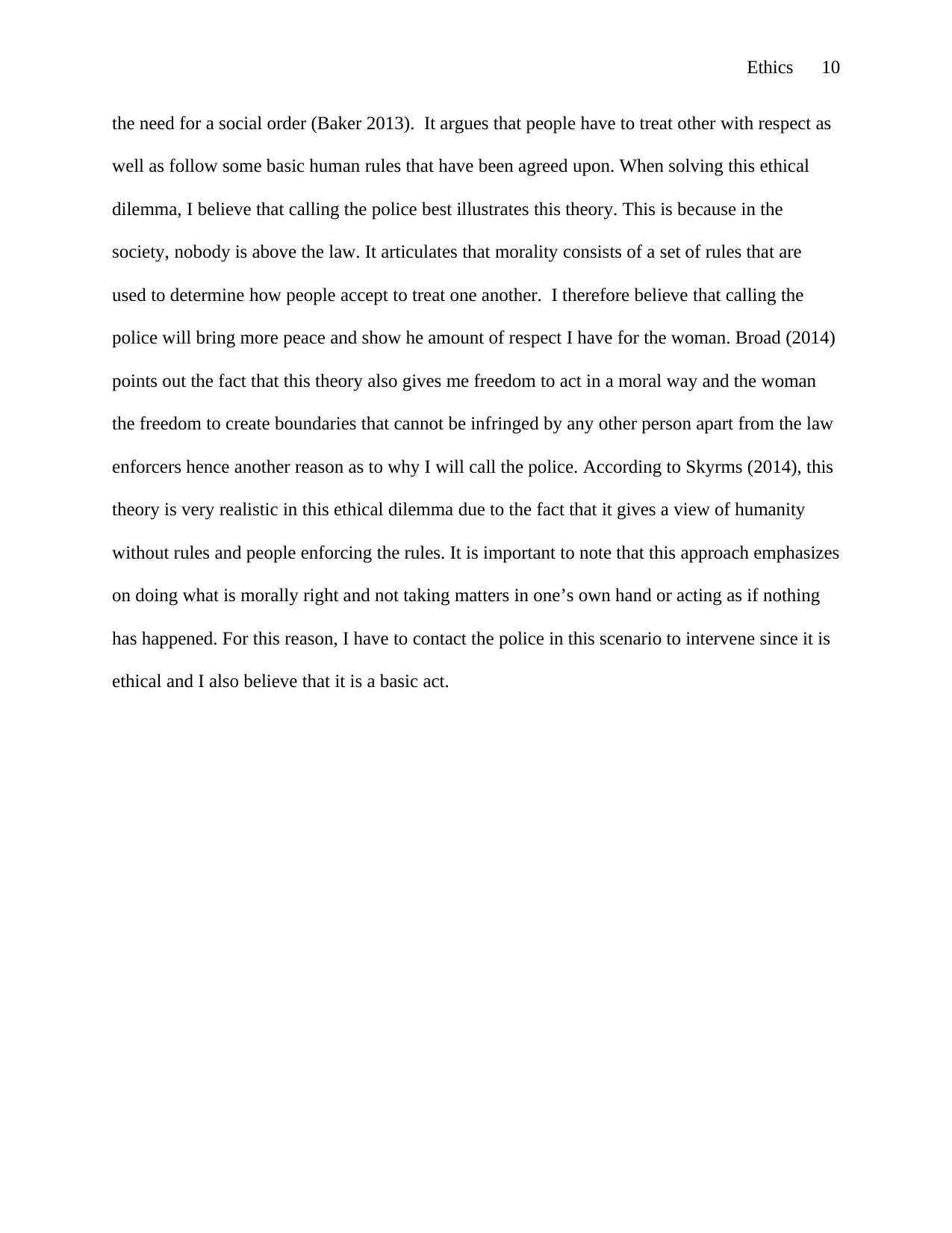
Ethics 10
the need for a social order (Baker 2013). It argues that people have to treat other with respect as
well as follow some basic human rules that have been agreed upon. When solving this ethical
dilemma, I believe that calling the police best illustrates this theory. This is because in the
society, nobody is above the law. It articulates that morality consists of a set of rules that are
used to determine how people accept to treat one another. I therefore believe that calling the
police will bring more peace and show he amount of respect I have for the woman. Broad (2014)
points out the fact that this theory also gives me freedom to act in a moral way and the woman
the freedom to create boundaries that cannot be infringed by any other person apart from the law
enforcers hence another reason as to why I will call the police. According to Skyrms (2014), this
theory is very realistic in this ethical dilemma due to the fact that it gives a view of humanity
without rules and people enforcing the rules. It is important to note that this approach emphasizes
on doing what is morally right and not taking matters in one’s own hand or acting as if nothing
has happened. For this reason, I have to contact the police in this scenario to intervene since it is
ethical and I also believe that it is a basic act.
the need for a social order (Baker 2013). It argues that people have to treat other with respect as
well as follow some basic human rules that have been agreed upon. When solving this ethical
dilemma, I believe that calling the police best illustrates this theory. This is because in the
society, nobody is above the law. It articulates that morality consists of a set of rules that are
used to determine how people accept to treat one another. I therefore believe that calling the
police will bring more peace and show he amount of respect I have for the woman. Broad (2014)
points out the fact that this theory also gives me freedom to act in a moral way and the woman
the freedom to create boundaries that cannot be infringed by any other person apart from the law
enforcers hence another reason as to why I will call the police. According to Skyrms (2014), this
theory is very realistic in this ethical dilemma due to the fact that it gives a view of humanity
without rules and people enforcing the rules. It is important to note that this approach emphasizes
on doing what is morally right and not taking matters in one’s own hand or acting as if nothing
has happened. For this reason, I have to contact the police in this scenario to intervene since it is
ethical and I also believe that it is a basic act.
Paraphrase This Document
Need a fresh take? Get an instant paraphrase of this document with our AI Paraphraser
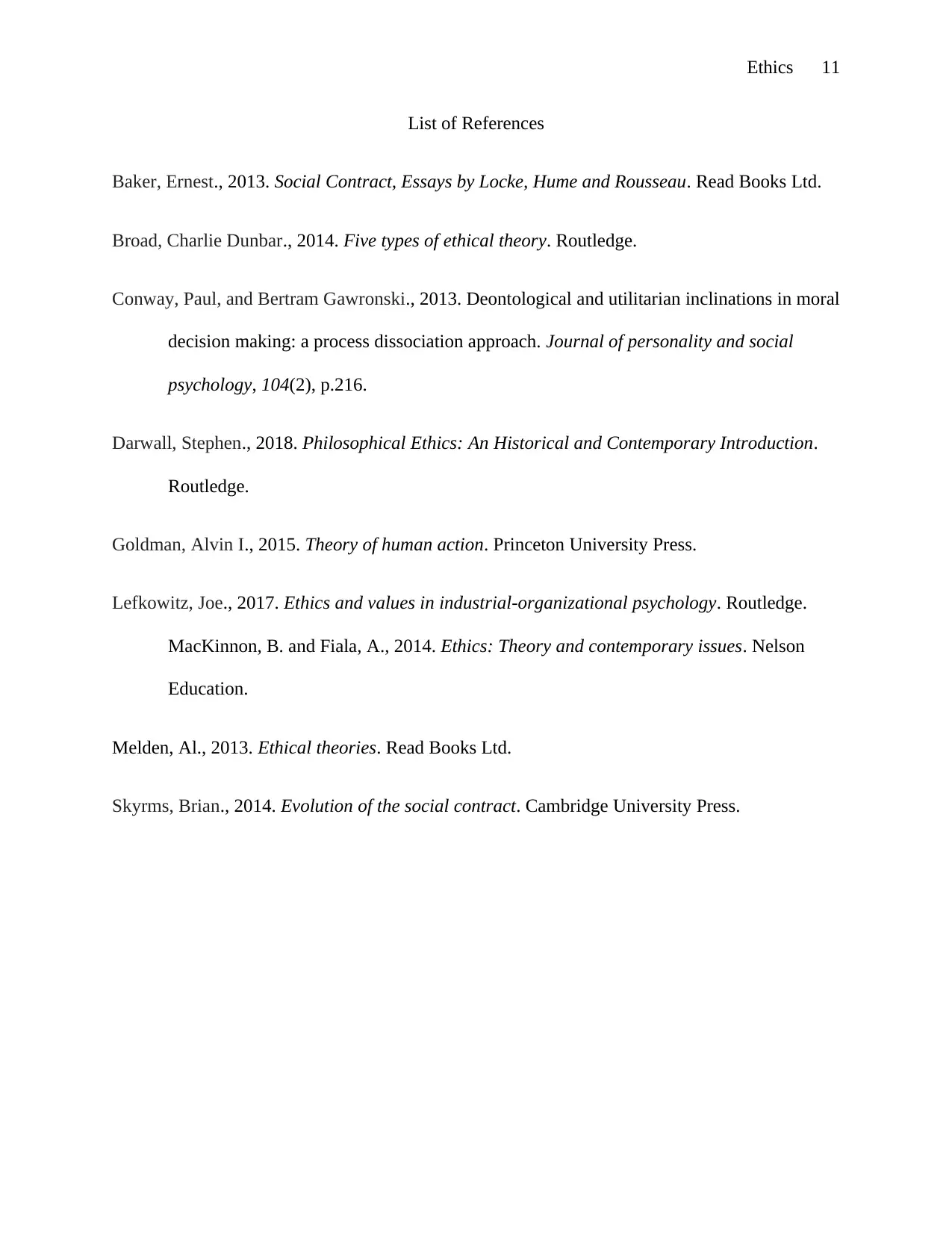
Ethics 11
List of References
Baker, Ernest., 2013. Social Contract, Essays by Locke, Hume and Rousseau. Read Books Ltd.
Broad, Charlie Dunbar., 2014. Five types of ethical theory. Routledge.
Conway, Paul, and Bertram Gawronski., 2013. Deontological and utilitarian inclinations in moral
decision making: a process dissociation approach. Journal of personality and social
psychology, 104(2), p.216.
Darwall, Stephen., 2018. Philosophical Ethics: An Historical and Contemporary Introduction.
Routledge.
Goldman, Alvin I., 2015. Theory of human action. Princeton University Press.
Lefkowitz, Joe., 2017. Ethics and values in industrial-organizational psychology. Routledge.
MacKinnon, B. and Fiala, A., 2014. Ethics: Theory and contemporary issues. Nelson
Education.
Melden, Al., 2013. Ethical theories. Read Books Ltd.
Skyrms, Brian., 2014. Evolution of the social contract. Cambridge University Press.
List of References
Baker, Ernest., 2013. Social Contract, Essays by Locke, Hume and Rousseau. Read Books Ltd.
Broad, Charlie Dunbar., 2014. Five types of ethical theory. Routledge.
Conway, Paul, and Bertram Gawronski., 2013. Deontological and utilitarian inclinations in moral
decision making: a process dissociation approach. Journal of personality and social
psychology, 104(2), p.216.
Darwall, Stephen., 2018. Philosophical Ethics: An Historical and Contemporary Introduction.
Routledge.
Goldman, Alvin I., 2015. Theory of human action. Princeton University Press.
Lefkowitz, Joe., 2017. Ethics and values in industrial-organizational psychology. Routledge.
MacKinnon, B. and Fiala, A., 2014. Ethics: Theory and contemporary issues. Nelson
Education.
Melden, Al., 2013. Ethical theories. Read Books Ltd.
Skyrms, Brian., 2014. Evolution of the social contract. Cambridge University Press.
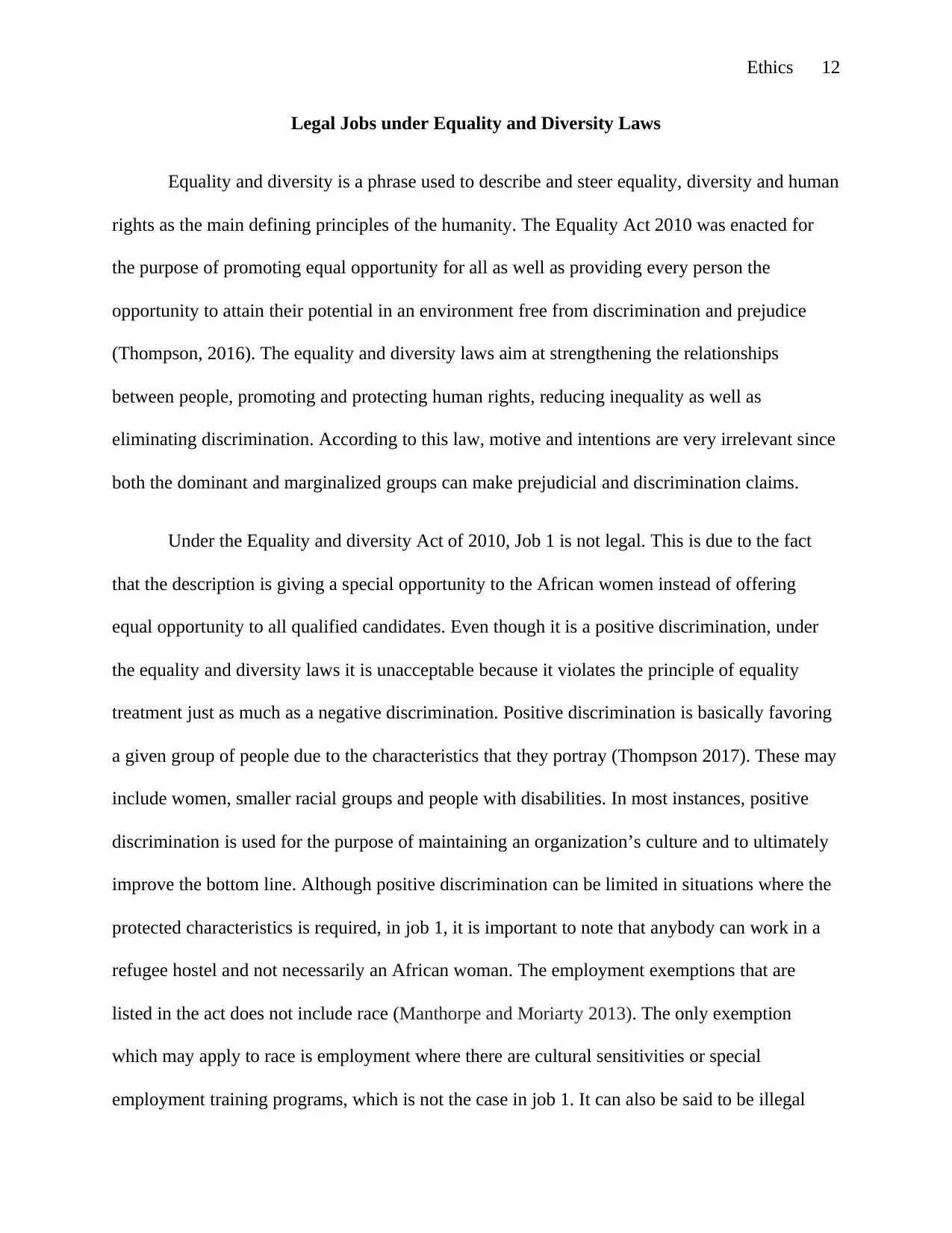
Ethics 12
Legal Jobs under Equality and Diversity Laws
Equality and diversity is a phrase used to describe and steer equality, diversity and human
rights as the main defining principles of the humanity. The Equality Act 2010 was enacted for
the purpose of promoting equal opportunity for all as well as providing every person the
opportunity to attain their potential in an environment free from discrimination and prejudice
(Thompson, 2016). The equality and diversity laws aim at strengthening the relationships
between people, promoting and protecting human rights, reducing inequality as well as
eliminating discrimination. According to this law, motive and intentions are very irrelevant since
both the dominant and marginalized groups can make prejudicial and discrimination claims.
Under the Equality and diversity Act of 2010, Job 1 is not legal. This is due to the fact
that the description is giving a special opportunity to the African women instead of offering
equal opportunity to all qualified candidates. Even though it is a positive discrimination, under
the equality and diversity laws it is unacceptable because it violates the principle of equality
treatment just as much as a negative discrimination. Positive discrimination is basically favoring
a given group of people due to the characteristics that they portray (Thompson 2017). These may
include women, smaller racial groups and people with disabilities. In most instances, positive
discrimination is used for the purpose of maintaining an organization’s culture and to ultimately
improve the bottom line. Although positive discrimination can be limited in situations where the
protected characteristics is required, in job 1, it is important to note that anybody can work in a
refugee hostel and not necessarily an African woman. The employment exemptions that are
listed in the act does not include race (Manthorpe and Moriarty 2013). The only exemption
which may apply to race is employment where there are cultural sensitivities or special
employment training programs, which is not the case in job 1. It can also be said to be illegal
Legal Jobs under Equality and Diversity Laws
Equality and diversity is a phrase used to describe and steer equality, diversity and human
rights as the main defining principles of the humanity. The Equality Act 2010 was enacted for
the purpose of promoting equal opportunity for all as well as providing every person the
opportunity to attain their potential in an environment free from discrimination and prejudice
(Thompson, 2016). The equality and diversity laws aim at strengthening the relationships
between people, promoting and protecting human rights, reducing inequality as well as
eliminating discrimination. According to this law, motive and intentions are very irrelevant since
both the dominant and marginalized groups can make prejudicial and discrimination claims.
Under the Equality and diversity Act of 2010, Job 1 is not legal. This is due to the fact
that the description is giving a special opportunity to the African women instead of offering
equal opportunity to all qualified candidates. Even though it is a positive discrimination, under
the equality and diversity laws it is unacceptable because it violates the principle of equality
treatment just as much as a negative discrimination. Positive discrimination is basically favoring
a given group of people due to the characteristics that they portray (Thompson 2017). These may
include women, smaller racial groups and people with disabilities. In most instances, positive
discrimination is used for the purpose of maintaining an organization’s culture and to ultimately
improve the bottom line. Although positive discrimination can be limited in situations where the
protected characteristics is required, in job 1, it is important to note that anybody can work in a
refugee hostel and not necessarily an African woman. The employment exemptions that are
listed in the act does not include race (Manthorpe and Moriarty 2013). The only exemption
which may apply to race is employment where there are cultural sensitivities or special
employment training programs, which is not the case in job 1. It can also be said to be illegal
⊘ This is a preview!⊘
Do you want full access?
Subscribe today to unlock all pages.

Trusted by 1+ million students worldwide
1 out of 17
Related Documents
Your All-in-One AI-Powered Toolkit for Academic Success.
+13062052269
info@desklib.com
Available 24*7 on WhatsApp / Email
![[object Object]](/_next/static/media/star-bottom.7253800d.svg)
Unlock your academic potential
Copyright © 2020–2026 A2Z Services. All Rights Reserved. Developed and managed by ZUCOL.





